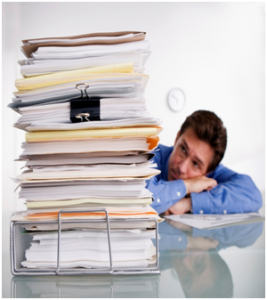 “US employees waste more than two hours a week finding, sharing and storing documents.”Smart Business Magazine &
“US employees waste more than two hours a week finding, sharing and storing documents.”Smart Business Magazine &
“Everyday Americans buy 62 million newspapers and throw out 44 million. That’s the equivalent of dumping 500,000 trees into a landfill every week.” Colorado.Edu
A huge source of stress and clutter in most homes and offices is Paper! It is also the number one problem for most businesses. Misplaced and mishandled paperwork is a major source of stress in most homes and a big burden for companies. Piles of paper can not only cause chaos but also affect productivity.
Isn’t it amazing how something so light as paper can create such a heavy mess? Whether you’re managing mail in your home or working from a small home office or a large corporation, it is beneficial to unclutter and organize your papers. However, organizing papers is not as simple as physically organizing your closet or kitchen. It takes a lot more mental energy sifting through papers and making decisions about them. So the most important resource you need to tackle the paper clutter is…time. You will also need the pertinent materials; anything from a suitable filing cabinet, folders & labels, to a sturdy shredder.
Here is a simple paper management system that can help you stay on top of the paper flow in your home or office:
1) Identify the Source: Your foremost step is to investigate the various ways that paper enters your home or office (e.g., email printouts, subscriptions, kid’s artwork, pay stubs, meeting agendas, etc). Create an efficient information system so you can merge and downsize wherever possible.
2) Manage the Mail: A majority of the paper clutter comes via the daily mail. Create a mail system so you can at least broadly sort the papers at the source of entry. Purchase a mail sorter to help organize the bills, cards, coupons separately. The key here is to place the mail sorter exactly where you, your assistant, or your family go through mail every day.
3) Dunk the Junk: Simplify your life by opting out of unwanted catalogs and credit card offers. You can do a lot, including calling 1888-5-OPT OUT and listing your mail preferences with the Direct Marketing Association.
4) Decide and Conquer: Certain decisions on what is junk mail can be made as you sort the mail itself, but other papers may need your discretion on what to archive and what to shred. You can always have a file cart for papers that either needs to be stored or accessed in the short term.
5) What To Do: Use a folder or a document box to keep all the papers that you need to do something about. For example, a bill that needs to be paid or a letter you need to reply to.
6) What To-Archive: Use binders or file folders to file away papers that need to be saved for your personal records or for tax purposes.
Chasing paper consumes a lot of time and energy. Maintenance of your paper system also is important, so review your filing system periodically and toss out the papers that are no longer needed.
Does this process help? Does it at least motivate you to get started? What are your biggest challenges with paper? Please share your thoughts in the comments below.

